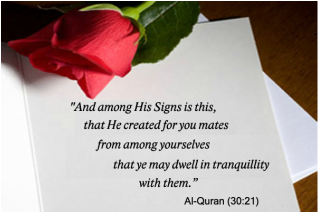If ye fear that ye shall not be able to deal justly with the orphans, Marry women of your choice, Two or three or four; but if ye fear that ye shall not be able to deal justly (with them), then only one, or (a captive) that your right hands possess, that will be more suitable, to prevent you from doing injustice. Qur'an 4:3 " I recall telling friends, “Maybe when I get older I will consider polygyny. I don’t think I will want someone up under me all of the time.” Then, I met my husband. I did not expect to like him as much as I do. MashaAllah!
For those who knew me, my openness to polygyny was not a secret. I had previously been exposed to it personally, both in a negative and positive light. Unbeknownst to me, this exposure prepared me and provided insight that I could not have developed independently. I learned what to do and what not to do. Some skills imparted to me by my personal circle of Muslimahs and elders would benefit any marriage. However, I also know polygyny has its own set of experiences. Some of which, one cannot prepare for without the help of Allah. No, I did not plan to be in a polygynous family. I planned, inshaAllah, to marry a man who pleased Allah and could please me. I prayed for the moment for years. I did not pray for him to be unmarried. I left out a key detail! One must be specific with duas! Prior to marriage, my husband informed me of his marital status. He was happily married and had been for 6 years. I appreciated the loving manner in which he described his wife. He never spoke negatively of her. Alhamdulilah. Clearly, this appealed to me. He had experienced polygyny before and did not negate its sensitivities. He explained his role and how important it was. He informed me of his preferences for the relationship between his wives. He had other benefits I found attractive. His existing wife knew of his intent to add on to his family. He made it clear he wanted two wives but would have one family. I knew this required a level of cooperation which I had not planned to do. I informed him I had no intentions of seeking to be her best friend. I had collected good friends and retained them for over 30 years. These relationships could not be replaced. I explained I likely would not go grocery shopping with her. Yet, I would surely be respectful, kind and sisterly. I had been given the option to speak with her prior to our marriage. I delayed doing so for months. To date, I do not know my reason. I just wasn’t ready it seems. What do you say to a potential co-wife during the first conversation? No script exists for this. A month prior to our nikkah, I requested to talk with her. We chatted on the phone for over an hour. As I made plans to relocate, she assisted me with identifying housing. When I visited the state to secure my relocation, she drove me around. We went to lunch. She took me to her place of business. Five months from the date of the initial introduction to my husband, we married.
1 Comment
This is the final installment in the "Marriage Series". Here are part 1 and part 2. " So you’ve found the person you want as your future spouse, you’ve asked them all of the proper questions and you’ve decided to get married. Now it’s time to plan the wedding. According to Islam, in order for a man and woman to be married, a nikkah must be conducted. In Islam, marriage is considered a contract and there are various components of this contract. The first is the proposal: This is when the man asks a woman for her hand in marriage, and as a form of respect, her family as well. Once the woman has accepted, they are now ‘intended’ and it is not permissible for another man to propose to her. It is important to note that although the two individuals have agreed to marry one another, they are still non-mahram to each other. The woman has no rights over the man and viceversa. They are not to be alone together or physically interact and they should still observe hijab around each other. The second component is the mahr: After the proposal has been accepted, the man offers the intended wife a mahr. In the Qur’an we’re told: And give women their Mahr as a free gift, but if they of themselves be pleased to give up to you a portion of it, then eat it with enjoyment and with wholesome result. Qur’an 4:4. " Although in recent times, it has become common for the woman or her parents to request a certain ‘amount’ from the future husband. It is actually of the Sunnah for the intended husband to offer a certain mahr to the woman. She then has the opportunity to accept or decline it. When it comes to the mahr, a few things must be remembered, such as: that both individuals must consent to the mahr, not their parents, that the mahr is her right and she should not be made to feel guilty for wanting one and that the mahr is a gift, it is not her dowry or bride price. There is no ‘limit’ on what the mahr can be, it can be cash, a certain item or something non-tangible like the teaching of some knowledge or recitation of a certain sura from the Qur’an. The mahr can be given right away or promise can be made(prior to the nikkah) for the mahr to be given later at a certain time. It is highly recommended though, that the mahr be given prior to the nikkah or at the nikkah.
After the proposal and mahr have been accepted, the third and final mandatory component is the actual nikkah ceremony. The nikkah can take place anywhere that is halal(i.e not a bar or a club but in your home, the masjid, a hall, etc) and it is to be performed by an imam or qadi. Unlike marriage ceremonies of other faiths, there is no ‘walking down the aisle and’ there are no bridesmaids or groomsmen. The only individuals who need to be in attendance are the officiant, the two individuals that are marrying each other, two Muslim witnesses and the wali(Muslim guardian who is related to the woman-it can be her father, brother, uncle, etc) or the wakil(a Muslim guardian who is not related to the woman, generally for Muslim women who do not have any ‘practicing’ Muslim male relatives). At the nikkah, a khutbah(sermon) is usually given in which the officiant generally speaks about the virtues of marriage, the rights of the spouses and other aspects of Marriage in Islam. After the ceremony is given, the officiant asks the woman if she has agreed to the mahr and consents to the marriage. She should respond with “I have given away myself, in Nikkah, to you, on the agreed mahr”. The man then immediately responds, “I have accepted the nikkah”. With these short statements, they are now husband and wife. After the nikkah, either on the same day or sometime later, a walima is held. The walima is essentially a feast that the groom offers to announce the marriage. The walima is not mandatory but it is highly recommended. Regardless of the individuals’ culture, the walima should abide by Islamic guidelines. There should be no alcohol, lewd music, inappropriate attire, etc. As with all gatherings, it is advised that men and women should be separate. |
INTRODUCTIONThe "Muslimah Worries" section of Striving Clarity is dedicated to discussing the things that Muslimahs often worry about from hijab to marriage to how to remain spiritual when you're unable to pray. Join us! Archives
October 2022
Categories
All
|


 RSS Feed
RSS Feed